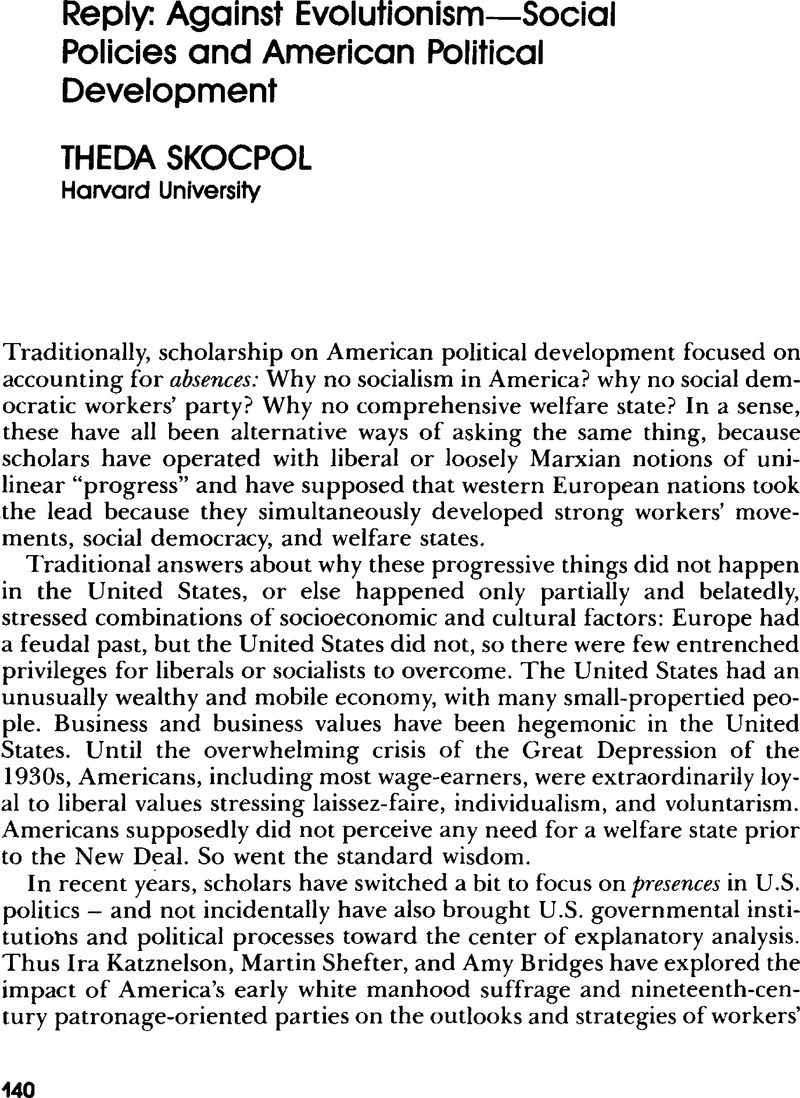No CrossRef data available.
Article contents
Reply: Against Evolutionism—Social Policies and American Political Development
Published online by Cambridge University Press: 16 December 2008
Abstract

- Type
- Conference Panel: On Theda Skocpol's Protecting Soldiers and Mothers: The Political Origins of Social Policy in the United States
- Information
- Copyright
- Copyright © Cambridge University Press 1994
References
1. Katznelson, Ira, City Trenches: Urban Politics and the Patterning of Class in the United States (New York: Pantheon Books, 1981)Google Scholar/ Shefter, Martin, “Trade Unions and Political Machines: The Organization and Disorganization of the American Working Class in the Late Nineteenth Century,” in Katznelson, Ira and Zolberg, Aristide R., eds., Working-Class Formation: Nineteenth-Century Patterns in Western Europe and the United States (Princeton, NJ: Princeton University Press, 1986), 197–276Google Scholar; and Bridges, Amy, A City in the Republic: Antebellum New York and the Origins of Machine Politics (New York: Cambridge University Press, 1984).Google Scholar
2. Forbath, William E., Law and the shaping of the American Labor Movement (Cambridge, MA: Harvard University Press, 1991)Google Scholar; and Hattam, Victoria, Labor Visions and State Power: The Origins of business Unionism in the United States (Princeton, NJ: Princeton University Press, 1992).Google Scholar
3. Skowronek, Stephen, Building a New American State: The Expansion of National Administrative Capacities, 1877–1920 (Cambridge and New York: Cambridge University Press, 1982).CrossRefGoogle Scholar
4. The 1993 Woodrow Wilson Foundation Award of the American Political Science Association; the 1993 J. David Greenstone Award of the Politics and History Section of the American Political Science Association (co-winner); the 1991–92 Best Book Award of the Political Sociology Section of the American Sociological Association (co-winner); the Allan Sharlin Memorial Award of the Social Science History Association; and the 1993 Ralph Waldo Emerson Award of Phi Beta Kappa.
5. McGerr, Michael, The Decline of Popular Politics: The American North, 1865–1928 (New York: Oxford University Press, 1986), chaps. 1 and 2.Google Scholar
6. In this respect, Stone's perspective is similar to that of Linda Gordon. For a full exchange between Linda Gordon and myself about these matters, see Contention: Debates in Society, Culture, and Science 2(3) (Spring 1993): 139–89.Google Scholar
7. See Protecting Soldiers and Mothers, 451, 452.Google Scholar
8. Skocpol, Theda and Ikenberry, John, “The Political Formation of the American Welfare State in Historical and Comparative Perspective,” Comparative Social Research 6 (1983): 87–148Google Scholar; Weir, Margaret, Orloff, Ann Shola, and Skocpol, Theda (eds.), The Politics of Social Policy in the United States (Princeton, NJ: Princeton University Press, 1988)Google Scholar; and Skocpol, Theda and Amenta, Edwin, “Did Capitalists Shape Social Security?” American Sociological Review 50(4) (08 1985): 572–75.Google Scholar


